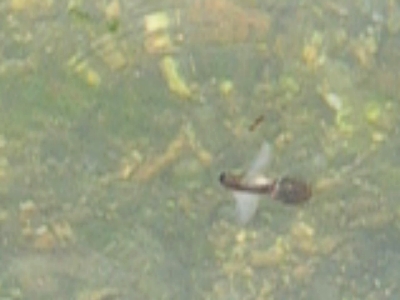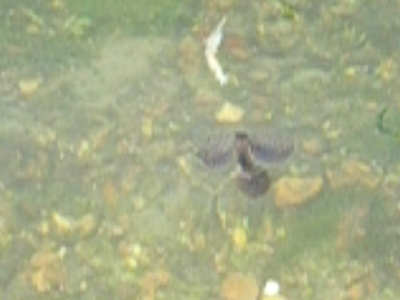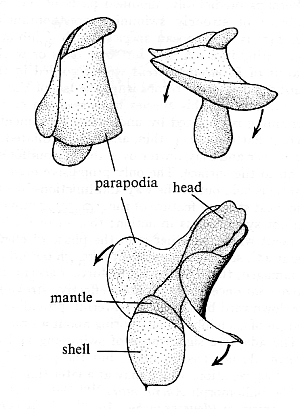Akera bullata swimming
July 17, 2006
From: Ian Buzzard


Never seen here before, moves along using umbrella-like vane opening and closing. Appears to rise to surface as if to breathe? then descends to bottom for a few minutes, and moves about looking like a bee in slow motion.There were about twenty of these at most, then they disappeared in June as weather got hotter. A lady at Blue Reef Aquarium at Southsea seemed to think it is a nudibranch, but did not know the particular type.The pics were extracted from video, so are not too clear.
Locality: Gosport, Hampshire, 1 to 2 feet, England, off The Solent, 24 May 2006, tidal creek, mostly salt. Length: 3 inches max. Photographer: Ian Buzzard.
Ian Buzzard
ian.buzzard@ntlworld.com
Buzzard, I.B., 2006 (Jul 17) Akera bullata swimming. [Message in] Sea Slug Forum. Australian Museum, Sydney. Available from http://www.seaslugforum.net/find/17136
Dear Ian,
This is an interesting observation which has rarely been reported. The animal is Akera bullata, which is a very primitive Sea Hare rather than a nudibranch [see Akeroidea Fact Sheet]. They have a bubble-shaped external shell and although they spend most of their time crawling or burrowing in fine mud on sheltered shores and bays, they can at time form swimming swarms, often in quite large numbers. Some say swarming is involved with breeding, while others say it is the juveniles that usually swarm, but basically this 'swarming - swimming' behaviour has not been studied in detail and only reported in the scientific literature 3 or 4 times, so it is not possible to say anything very sensible about it. The drawing alongside is from Morton & Holme (1955) who report spawning and swimming from April-July in the English Channel coast. Theanimals swim rather awkwardly with their heavy (shelled) end hanging down, more like large heavy flying beetles, than bees. I haven't any photos of living Akera bullata, but it is quite similar in shape to Akera soluta from the Pacific.
-
Morton, J. E. and Holme, N. A. (1955) The occurrence at Plymouth of the marine opisthobranch Akera bullata, with notes on its habits and relationships. Journal of the Marine Biological Association, United Kingdom 34: 101-112
Best wishes,
Bill Rudman
Related messages
-
Looking for live Akera bullata
From: Jeffrey S. Prince, November 20, 2009 -
Re: Akera bullata swimming
From: Clare & Dick Donovan, April 21, 2008 -
Re: Akera bullata swimming
From: Barry Drinan, August 6, 2007 -
Re: Akera bullata swimming
From: Wellington Grey, July 5, 2007 -
Akera bullata from French Mediterranean [2]
From: Sylvie Grall, June 20, 2007 -
Akera bullata from the French Mediterranean
From: Sylvie Grall, June 20, 2007 -
Akera bullata from Dorset, UK
From: Helen C Marshall, June 12, 2007 -
Re: Akera bullata swimming
From: Andrej Jaklin, July 20, 2006 -
Re: Akera bullata swimming
From: Ian Buzzard, July 18, 2006
